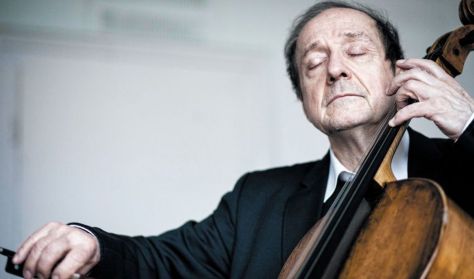
Orchestral concert: Ligeti 100
In 2023, the Festival Orchestra pays homage to György Ligeti, born a hundred years ago, with a grand concert.
more

In 2023, the Festival Orchestra pays homage to György Ligeti, born a hundred years ago, with a grand concert.
more
Ön egy múltbeli eseményre keresett rá. Kérjük, válogasson aktuális kínálatunkból a Jegy.hu keresőjében!
Last event date: Tuesday, March 28 2023 7:45PM
One of the most significant composers of the post-World War II half century, Ligeti bequeathed to us an extraordinarily colorful œuvre. He was interested in all periods of musical history, was attracted by literature, and, ever since his youth, he was tied up with mathematics. All this infiltrated into his works, always revealing layers for research that are often beyond music. Ligeti left Hungary in 1956 and got to know the greatest figures of avant-garde art in Cologne. Soon he, too, was one of them. His selected works are conducted by the founding member of the Kossuth Prize laureate Amadinda Percussion Group, Zoltán Rácz.
The concert begins with Ligeti’s last completed work called With Pipes, Drums, Fiddles; the piece takes its title from a well-known children’s song. In the seven movements for mezzo-soprano, four percussionists, and a number of other instruments, Ligeti sets to music the poetry of Sándor Weöres. The piece plays with the musicality and rhythm of the words.
This will not be the first time that one of the greatest cellists of our time, Miklós Perényi, has performed Ligeti’s Cello Concerto with the BFO. Composed in 1966, the work is not a typical concerto; it is actually a piece based on the cello yet being in continuous motion as regards orchestration. The two movements, opposite in character, are related by their structure. The first movement slowly unfolds from an eightfold piano; and the concerto culminates in a swirl of various types of motion.
Of all Ligeti’s works, it is probably Poème symphonique that triggered the strongest emotions; a television channel refused to broadcast it in 1963. Set for one hundred metronomes, ten performers to start them ticking, and a conductor to manage the whole process, the “symphonic poem” first sounds like a noisy clicking of metronomes, yet those listening more carefully can hear the emergence of intriguing rhythm patterns.
Ligeti was open-minded to folk music as well, collecting folk songs himself, but in his “Romanian Concerto” from 1951 he uses his own, original, folk song-like melodies, just like Bartók did. The four movements, played attacca, recall the composer’s childhood memories, his first encounter with the sound of the alpenhorn among them.
San Francisco Polyphony was composed for the 60th anniversary of the San Francisco Symphony Orchestra. The piece, scored for an enlarged ensemble, begins with a cloud depicted with sound patches, then slowly develops. Tunes, sometimes emerging, sometimes blending, frequently travel among the instruments, producing compelling modulations of timbre.
György Ligeti: With Pipes, Drums, Fiddles;
Concerto for Cello and Orchestra;
Poème symphonique;
Concert Românesc;
San Francisco Polyphony
Jubilee concert to celebrate the 100th anniversary of the composer’s birth
Katalin Károlyi (mezzo-soprano)
Miklós Perényi (cello)
Zoltán Rácz (conductor)
A Szépség és a Szörnyeteg a Disney egyik legsikeresebb, legelbűvölőbb meséje, az első olyan animációs film, amelyet Oscar-díjra jelöltek a Legjobb film kategóriájában, és öt Grammy-díjat is kapott.
A nagyszabású musicalt, amelyben a Halál lép elő főszereplővé, az egyik legnépszerűbb zenés színházi darabként tartják számon, 1992 óta hódít világszerte töretlen sikerrel.
„Túl sötét.” „Micsoda posvány!” „Csupa ronda emberről ír!” „Ez a darab előadhatatlan, már a dialógusai miatt is.” „Disznók vagytok ti…
item(s) in basket
total:
Time limit has expired. Please, put item(s) in to basket again.